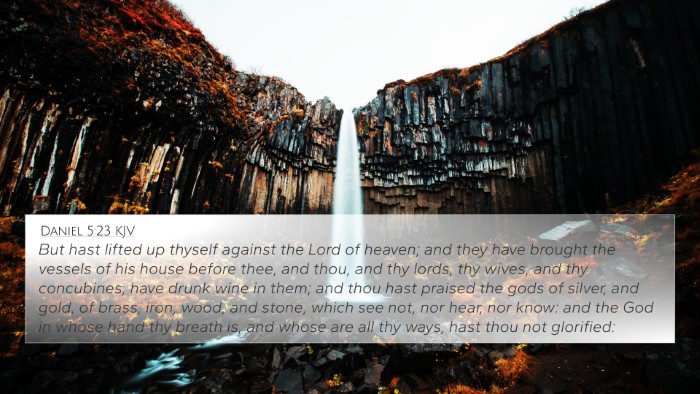Understanding 1 Samuel 5:2
Verse: "When the Philistines took the ark of God, they brought it from Ebenezer unto Ashdod."
This verse marks a significant moment in the biblical narrative where the Ark of the Covenant, a symbol of God's presence among His people, is captured by the Philistines. It reflects themes of loss, divine sovereignty, and the tension between God's people and their enemies.
Verse Analysis
The act of taking the Ark represents not only a military victory for the Philistines but also a spiritual challenge for Israel. Matthew Henry observes that the Ark represents God's covenant with His people, and its capture signifies a moment of judgment. Albert Barnes expands on this idea, emphasizing that the Philistines misunderstood the Ark's significance and the power of the God it represented. Adam Clarke notes the cultural implications of moving the Ark into Philistine territory, where it would be placed in a context of idolatry and polytheism.
Thematic Connections
1 Samuel 5:2 can be explored through various thematic connections and cross-referencing, such as:
- God’s Sovereignty: The outcome of situations often reflect His overarching authority.
- Divine Presence: The Ark symbolizes God's presence, which contrasts with the impending defeat of Israel due to sin.
- Judgment and Retribution: The capture is linked to Israel's unfaithfulness, leading to God’s judgment.
- Inflated Pride: The Philistines' arrogance in taking the Ark foreshadows their eventual defeat.
- Idolatry vs Monotheism: The contrasting worship practices highlighted by the Philistines’ treatment of the Ark.
Cross-References
Several Bible verses relate to 1 Samuel 5:2, offering deeper insights into its message:
- 1 Samuel 4:10-11 - The loss of the Ark to the Philistines is prophesied.
- Exodus 25:22 - Signifying God’s presence and instructions regarding the Ark.
- Psalms 78:60-64 - Reference to God's judgment on Israel for their unfaithfulness.
- Jeremiah 7:14 - Warning of God abandoning His people due to their sins.
- Isaiah 43:3-4 - God's promise of protection for His chosen people.
- Ezekiel 10:18 - The departure of God's glory from the Temple.
- Acts 7:44-50 - Reference to God’s presence not being limited to the Ark or physical locations.
Key Insights from Public Domain Commentaries
When interpreting 1 Samuel 5:2, commentators emphasize various perspectives:
- Matthew Henry: Focuses on the theological implications, indicating that Israel's sins led to this consequence.
- Albert Barnes: Explains the Philistines' ignorance regarding the true nature of the Ark and God's power.
- Adam Clarke: Looks into the cultural and historical context of the Ark's placement in the temple of Dagon.
How This Verse Relates to Broader Scriptural Themes
1 Samuel 5:2 is a pivotal text that reflects the struggles between spiritual fidelity and cultural pressures. It serves as a reminder of the constant battle between God’s people and surrounding influences. This can be seen when observed alongside:
- Prophetic Warnings: Ezekiel's visions of God's departure symbolize the serious consequences of unfaithfulness.
- New Testament Links: Thoughts about true worship being more than physical artifacts, as expressed in John 4:24.
Conclusion
This exploration of 1 Samuel 5:2, alongside its cross-references and commentary insights, reveals profound lessons on faithfulness, accountability, and understanding God’s sovereignty over history. For deeper study, utilizing Bible concordance and Bible cross-reference guide tools can further enhance understanding of biblical texts and their thematic connections.








